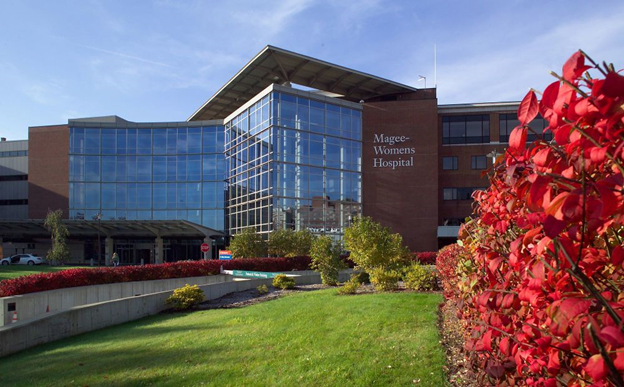UPMC MAGEE FERTILITY PRESERVATION & RESEARCH PROGRAMS

The UPMC Fertility Preservation Program is part of the pioneering UPMC Magee Center for Reproduction and Transplantation at UPMC Magee-Womens Hospital. UPMC is a leader in world-class fertility preservation services for adults and children of all ages. Their researchers focus on conditions that impact fertility. These range from diseases and genetic defects to aging and medical treatments for cancer. Research also includes gender dysphoria and other issues. UPMC’s doctors directly apply research insights to patient care and treatment. Working together, UPMC is developing state-of-the-art technologies to preserve fertility and treat infertility.
UPMC’s Fertility Preservation services are offered in collaboration with:
UPMC’s goal is to give you options to have the family you always wanted — or to add to the family you already have.

The Fertility Preservation Program and Center for Reproduction and Transplantation at Magee-Womens Hospital, University of Pittsburgh Medical Center are recruiting for a research study in which research will be done on testicular tissue. It may be of interest to male subjects who wish to freeze testicular tissue because of risk of infertility due to their disease or medical treatment. This IRB-approved research protocol is open to males of any age with two testes who have a newly-diagnosed or recurrent disease or medical treatment (such as chemotherapy or radiation) that puts them at significant risk for infertility.
For young patients who are not yet producing mature sperm or males who cannot produce a semen sample, techniques are in development to use frozen testicular tissue to produce sperm and/or restore fertility.
In this study, the testicular tissue is collected during surgery and allocated as follows:
The research study will cover the costs of surgery, tissue processing, tissue freezing, and the first year of frozen storage.
For additional information or to enroll in the study, please contact Magee’s program coordinators by phone (412-641-7475) or email (fertilitypreservation@upmc.edu).
Click image to view program brochure.
The Fertility Preservation Program and the Center for Reproduction and Transplantation at Magee-Womens Hospital, University of Pittsburgh Medical Center are recruiting for a research study in which research will be done on testicular tissue. This study may be of interest to transgender subjects who wish to freeze testicular tissue because of risk of infertility due to gender-affirming treatments. This IRB-approved experimental protocol is open to transgender individuals with testes over the age of 9 who have been diagnosed with gender dysphoria and are receiving gender affirming treatments or planning to start gender affirming treatments (hormone suppression or cross-sex hormones), do not wish to delay or interrupt their gender affirming treatments to experience male puberty and produce sperm, and have a referral for a fertility preservation consultation from their primary care physician/team.
For young patients who are not yet producing mature sperm, cannot produce a semen sample, or do not want to experience male puberty, techniques are in development to use frozen testicular tissue to produce sperm and/or preserve fertility.
In this study, the testicular tissue is collected during surgery and allocated as follows:
The research study will cover the costs of surgery, tissue processing, tissue freezing, and the first year of frozen storage.
For additional information or to enroll in the study, please contact Magee’s program coordinators by phone (412-641-7475) or email (fertilitypreservation@upmc.edu).
Click image to view program brochure.
The Fertility Preservation Program in Pittsburgh and the Center for Reproduction and Transplantation at Magee-Womens Hospital, University of Pittsburgh Medical Center is enrolling patients for ovarian tissue cryopreservation. This IRB-approved experimental protocol is open to:
This research study is for female patients facing a gonadotoxic disease or treatment regimen that can threaten fertility. For young patients who are not yet producing mature eggs or women who are unable to freeze eggs, frozen ovarian tissue might be used in the future to restore fertility or hormone function. The program will cover the costs of surgery, tissue processing, tissue freezing, and the first year of frozen storage.
For additional information or to enroll in the study, please contact Magee’s program coordinators by phone (412-641-7475) or email (fertilitypreservation@upmc.edu).
Click image to view program brochure.
The Fertility Preservation Program and the Center for Reproduction and Transplantation at Magee-Womens Hospital, University of Pittsburgh Medical Center are recruiting for a research study in which research will be done on ovarian tissue. This study may be of interest to transgender subjects who wish to freeze ovarian tissue because of risk of infertility due to gender affirming treatments. This IRB-approved experimental protocol is open to transgender individuals with ovaries over the age of 9 who have been diagnosed with gender dysphoria, are receiving gender affirming treatments or planning to start gender affirming treatments (hormone suppression or cross-sex hormones), do not wish to delay or interrupt their gender affirming treatments to experience female puberty and undergo an egg retrieval procedure, and have a referral for a fertility preservation consultation from their primary care physician/team.
For young patients who are not yet producing mature eggs or patients that do not want to experience female puberty, techniques are in development to use frozen ovarian tissue to produce mature eggs and preserve fertility.
In this study, the ovarian tissue is collected during surgery and allocated as follows:
The research study will cover the costs of surgery, tissue processing, tissue freezing, and the first year of frozen storage.
For additional information or to enroll in the study, please contact Magee’s program coordinators by phone (412-641-7475) or email (fertilitypreservation@upmc.edu).
Click image to view program brochure.